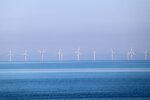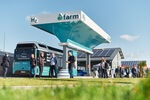News Release from RWE Renewables GmbH
Wind Industry Profile of
RWE joins forces with leading institutions in Lithuania to drive education on offshore wind energy
RWE has joined forces with leading Lithuanian educational institutions to accelerate the development of offshore wind energy in the Baltic Sea, based on education, research and knowledge transfer. Corresponding Letters of Intent (LoI) were signed with Klaipeda University, Lithuanian Maritime Academy, Klaipeda State University of Applied Sciences and the Klaipeda Paulius Lindenau Training Center.
“Offshore wind is key to meeting the increasing demand for renewable power and creates new, future-proof jobs. The strong interconnection between the Baltic countries and their neighbouring Nordic and Western regions opens up opportunities for energy export. So the Baltic Sea could become a future power hub in Europe. At RWE, we want to help make that happen,” said Andreas Hammar, Vice President Offshore Wind Development Services Nordics, Baltics, & Poland at RWE Renewables during yesterday’s signing ceremony.
The Baltic States have ambitious climate targets and offshore wind expansion is often at the core of these plans. Lithuania has announced its first central offshore wind tender for a wind farm of up to 700 megawatts by the end of 2023. For the Baltic Sea as a whole, a target of 20 gigawatts of offshore wind capacity by 2030 has been set.
“To deliver the ambitious offshore build-out targets in the Baltic Sea, a variety of qualified personnel will be needed – during development, construction and operation. Together with the four leading educational institutes we are laying the foundation today for the future success of offshore wind in Lithuania and the wider Baltic region,” added Anu Eslas, Vice President Offshore Development Baltic States at RWE Renewables.
It is planned to share knowledge and expertise and to identify opportunities for joint research in the field of offshore wind energy. Educational programmes are to be set-up to teach the knowledge and competencies required to work in the offshore wind sector.
University of Klaipeda
Renewable energy and sustainability are among the key strategic focusses of Klaipeda University (KU). KU researchers are actively engaged in these areas; international cooperation and joint programmes are being developed with its partners from the EU-CONEXUS European University. “Agreements with industry partners working in the field of renewable energy – their experience, needs, and perspectives – are important and useful for us, as they open up opportunities for new research, joint projects and innovative solutions,” said KU Rector Professor Dr Art?ras Razbadauskas.
Lithuanian Maritime Academy
“The Lithuanian Maritime Academy is delighted with this new partnership with RWE. We believe that cooperation between higher education institutions and industry is of major importance in terms of responding to the needs of society and the labour market, reacting rapidly and training highly qualified specialists capable of adapting to changes,” said Vaclav Stankevi?, Director of Lithuanian Maritime Academy. “We believe that the development and diversity of our studies is very important, and that is reflected in this cooperation and in the new opportunities for our students or graduates to gain employment in the offshore wind industry.”
Klaipeda State University of Applied Sciences
Klaipeda State University of Applied Sciences is a modern higher education institution that contributes to the pursuit of sustainable management of natural resources and their effective use by strengthening regional and international cooperation and the opportunities of using the achievements provided by science and technology. “Lithuania is determined to forge ahead with the Green Course and strengthen energy independence. The first offshore wind farm is being developed and it will not only ensure a more sustainable environment for future generations, but also the growth of the coastal region and the creation of new workplaces,” stated Gražina Markvaldien?, Director of Klaipeda State University of Applied Sciences. “We have many years of experience in training electrical engineering specialists. We see the collaboration with RWE as a way to modernise and enhance the study programme and contribute to the training of specialists needed for offshore wind.”
Klaipeda Paulius Lindenau Training Center
Klaipeda Paulius Lindenau Training Center is the only specialised vocational school in Lithuania that provides vocational training for sea, port, shipping, the engineering industry, as well as energy and technologies related to shipbuilding and transportation. “We are creating synergies for energy. The main prerequisites for successful business development are technologies and qualified professionals. RWE is proficient in the new technologies and competencies required in this area. Our mission is to prepare highly qualified professionals. Our activities are directed towards the engineering industry, energy and shipping as we have expertise, experience and infrastructure in these areas. We hope the synergy from our partnership with RWE will help to develop the renewable energy sector at sea,” said Dr Egidijus Skarbalius, Director of the Klaipeda Paulius Lindenau Training Center.
RWE has strong expertise along the entire offshore wind value chain
RWE is a leading global player in renewables and No. 2 worldwide in offshore wind. RWE operates 18 offshore wind farms in five countries – including Kårehamn (48 MW) off the Swedish coast, the Danish offshore wind farm Rødsand 2 (207 MW, RWE share: 20%) and Arkona, with 385 MW one of the largest offshore wind farms in the German Baltic Sea (RWE share: 50%). By 2030, RWE intends to grow its offshore wind capacity from currently 3 GW to 8 GW (this capacity represents RWE’s share only). The focus for further growth is on North America, the Asia Pacific region and attractive markets in Europe – including the Baltic States.
- Source:
- RWE
- Author:
- Sarah Knauber
- Email:
- sarah.knauber@rwe.com
- Keywords:
- rwe, Baltic states, Lithuania. offshore, offshore wind, carbon footprint, energy, wind tender, descarbonization



























